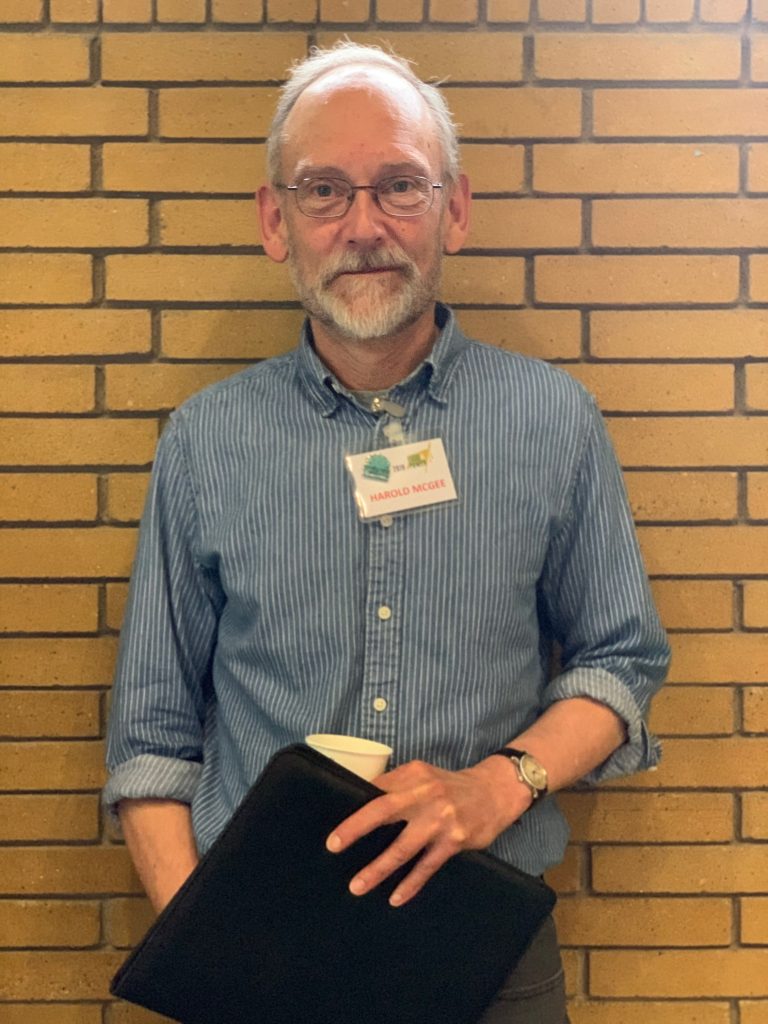
Harold McGee 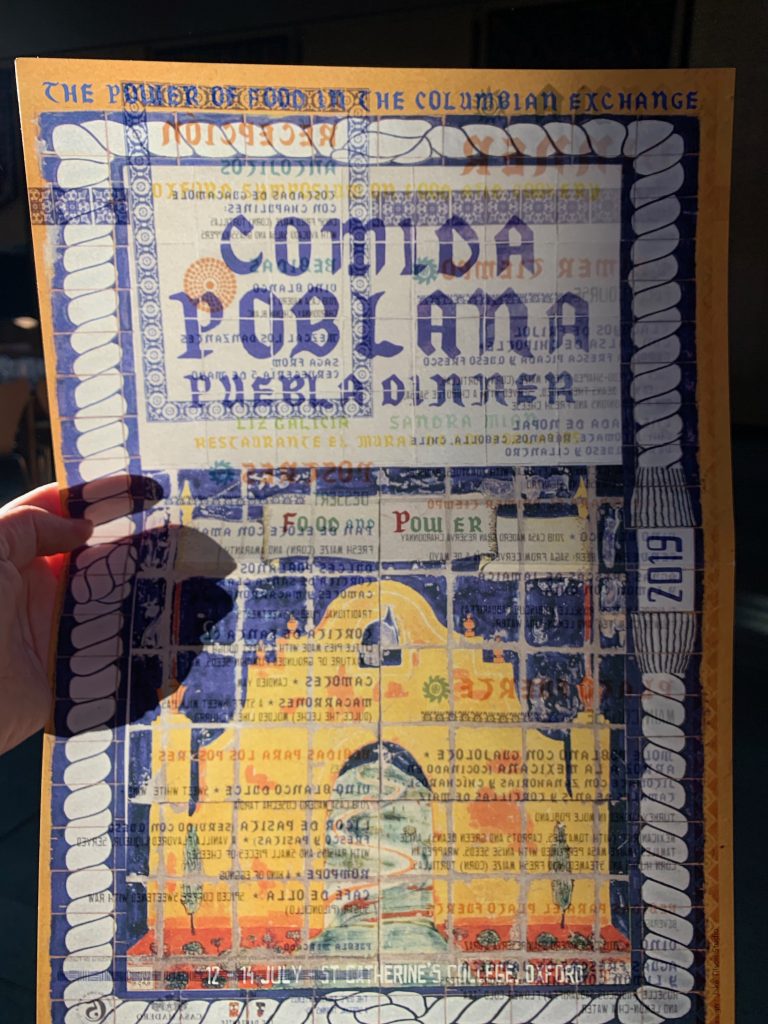
Menu designed by Jake Tilson
I’ve been wanting to attend the Oxford Food Symposium for the last decade, since several symposiasts came to my supper club just prior to the 2009 conference. The idea of several days in an Oxford university student digs, learning about food history, anthropology, politics, nutrition and general geekery feels like a heaven-sent opportunity. The only obstacle is price- £450 – although it includes accommodation, lectures, food and plentiful drink, all in the company of the most original food thinkers and writers from around the world.
I took the plunge, ponied up the dosh and didn’t regret it.
The programme starts on Friday afternoon, with a plenary lecture for everybody and an evening meal. Saturday and Sunday are a mixture of smaller talks spread over three different rooms, where you have to make a choice, and plenary speeches for the biggest names. People of the calibre of Harold McGee, Marion Nestle, Joanna Blythman, Claudia Roden are talking.
I arrived early to take advantage of a wikipedia training session run by Roberta Wedge, who also gave a talk later in the conference. Only 17 % of wikipedia biographies are of women. Most editors are men. This project attempts to increase both female participation and content. The male bias extends to subject matter: there are pages and pages on warfare but very little on the subject of food for instance. Roberta busted a few myths, for instance, that wikipedia is inaccurate. It’s no longer true: selection of entries and information is rigorously checked and maintained.
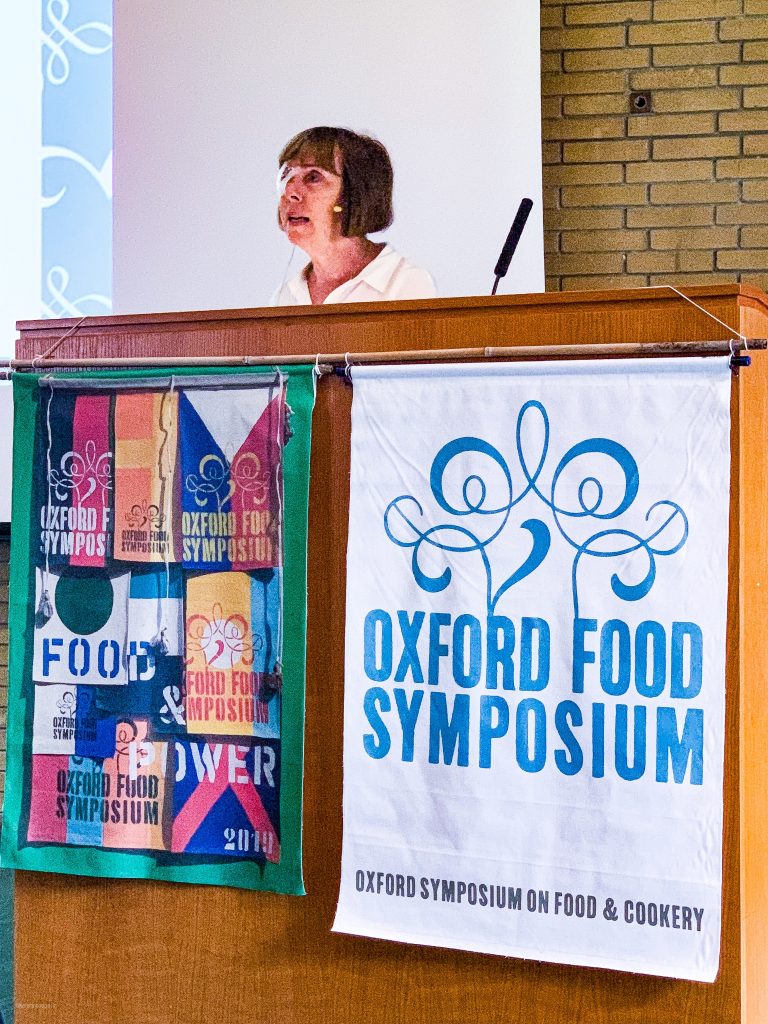
Joanna Blythman 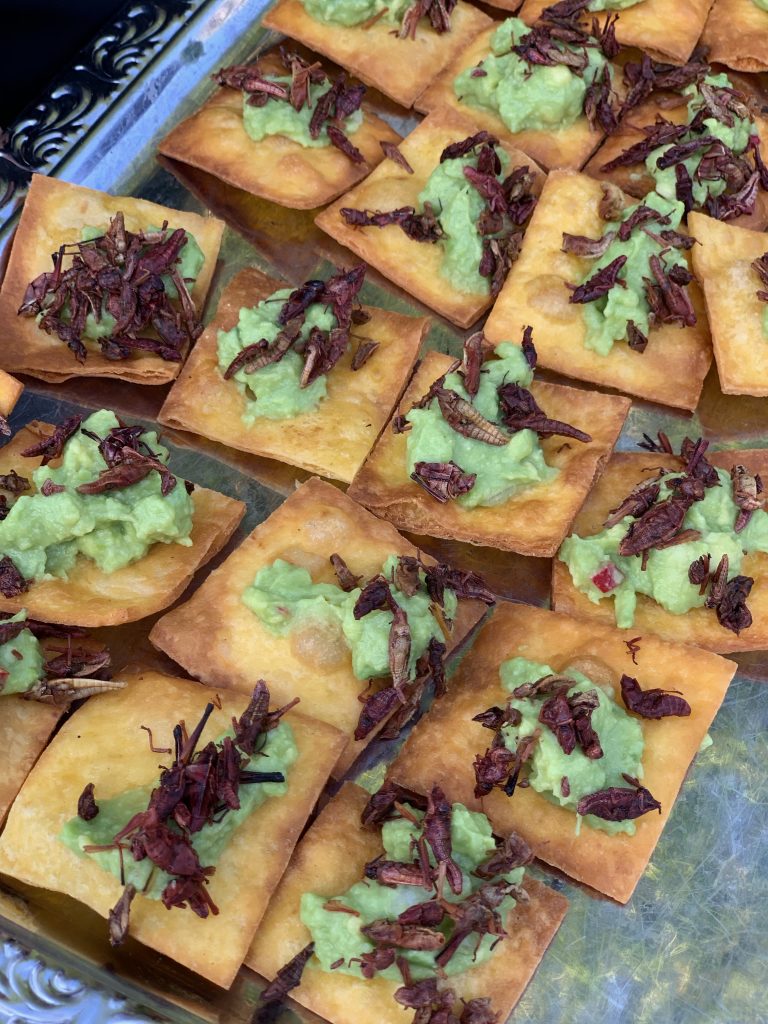
Grasshopper nachos
The theme of this year’s conference was Food and Power. Friday evening’s keynote lecture was by investigative food reporter Joanna Blythman. She sometimes causes controversy on Twitter for her food elitism and regular diatribes about non-meat eaters and vegan meat replacement food. Apart from this tendency, she tends to be spot on about most things. ‘50% of British food is ultra processed’. ‘Food safety punishes small businesses like Errington Cheese‘ (a Scottish raw cheese producer who was pushed to bankruptcy after being blamed for the death of a child from e-coli. They were cleared.)
It was the first lecture I attended, but after an intervention by vegetarian professor Aeyal Gross was more or less ignored, I stuck my hand up.
‘Surely you must agree that people eat too much meat, that meat should be a treat, that a plant based diet is the future?’ I continued: ‘I agree with most of what you say, but there always seems to be an element of anger towards vegetarians and vegans in your work’. At this, the hall collectively gasped.
‘I’m sorry if I sound angry, I’m just exasperated’ replied Joanna.
At least two more people held up their hands and asked questions about her anti-vegetarian views. Blythman is against vegan junk food and imitation meat, saying it’s just another ultra processed food. She asserts not eating meat is bad for health. It’s worth pointing out that Joanna is Scottish and there is a strong pastoral farming lobby in Scotland. There isn’t much arable or crop growing land in Scotland. This may colour her views.
Life has become much easier over the last five years if you eat a plant-based diet. Restaurants, supermarkets, fast food outlets are more likely to offer options for specialist diets. Blythman, rightly or wrongly, sounds like she wants to roll back recent gains for vegetarians and vegans. I understand that in the media and on social media, it might ‘feel’ like the vegans have taken over and that carnivores are a beleaguered minority, but the reality is most people still eat meat. We are the minority. And some of her claims about protein were simply wrong. The average adult requires around 50g to 80g of protein a day. Most portions of meat are between 150 and 250g a day and people don’t eat meat just once a day.
My position as a food ‘minority’ was further underlined during the Friday evening meal: there were no vegetarian canapés, only ones containing grasshoppers. The rice contained chicken stock – why? I had so little to eat I was grateful I’d bought myself a sandwich earlier. If you ate meat, you were pleasurably stuffed to the gills.
A few people came up to me to thank me for challenging Joanna or possibly just for asking questions as a newbie.
Fuchsia Dunlop, the Chinese food expert, gave me a baleful look however on hearing me discuss Joanna’s talk. As regular readers will know, I’m always in trouble for being a disruptor.
Symposium
symposium
/sɪmˈpəʊzɪəm/
noun
noun: symposium; plural noun: symposia; plural noun: symposiums
1.
a conference or meeting to discuss a particular subject.
a collection of essays or papers on a particular subject by a number of contributors.
2.
a drinking party or convivial discussion, especially as held in ancient Greece after a banquet (and notable as the title of a work by Plato).
The symposium part of the weekend was generally a huge success: a large hall filled with beautifully laid refectory tables. The sound level was high as people connected with chatter, laughter and gustatory enjoyment up and down the tables.
After dinner, there are sketches, one in which Elisabeth Luard, wearing a blonde wig, pretended to be Emily Maitlis of Newsnight interrogating the ‘Brexit minister for food security’, played by Len Fisher (here is a video, dodgy filming by me). Naturally, with the audience consisting mostly of middle-class white people from London/South East of England, Brexit was ridiculed.
Did it not occur that some symposiasts might actually agree with Brexit? One woman walked out. I wonder if she was a Brexiteer. I was unaware of the Symposium after-dinner tradition of games and amusements so I’d been excited by the thought we’d hear a government minister who could give us the low-down.
A hot sleepless night in the dorm and I woke too late for breakfast and Harold McGee’s talk. I decided to live tweet the conference to give myself something to do.
Best talks with a few quotes:
It’s hard to get round the whole conference, so this is my selection of the talks that I attended. There is the odd dud talk, not because the subject matter was boring but mostly due to the speaker failing to connect with the audience, reading from notes and, as one symposiast complained: ‘having bad diction’. You could really tell the teachers and the lecturers from the rest, they were used to performing their papers rather than just mumbling their way through a piece. Another problem for me was when they relied on academic vocabulary rather than clear and simple explanations.
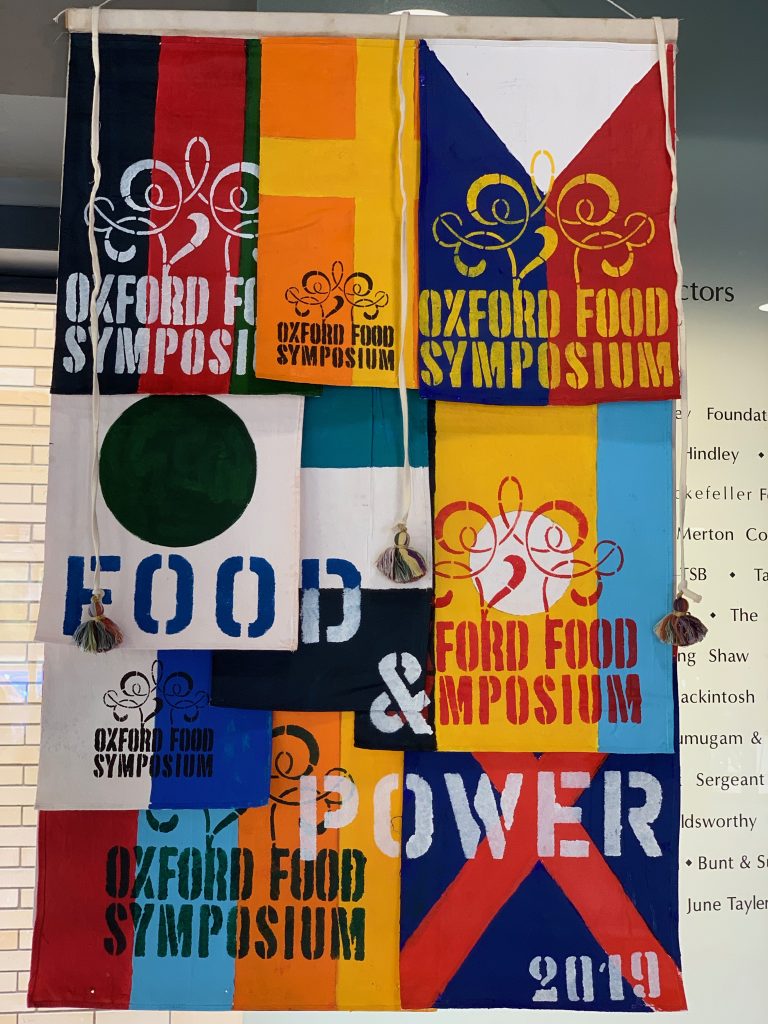
Food and Power 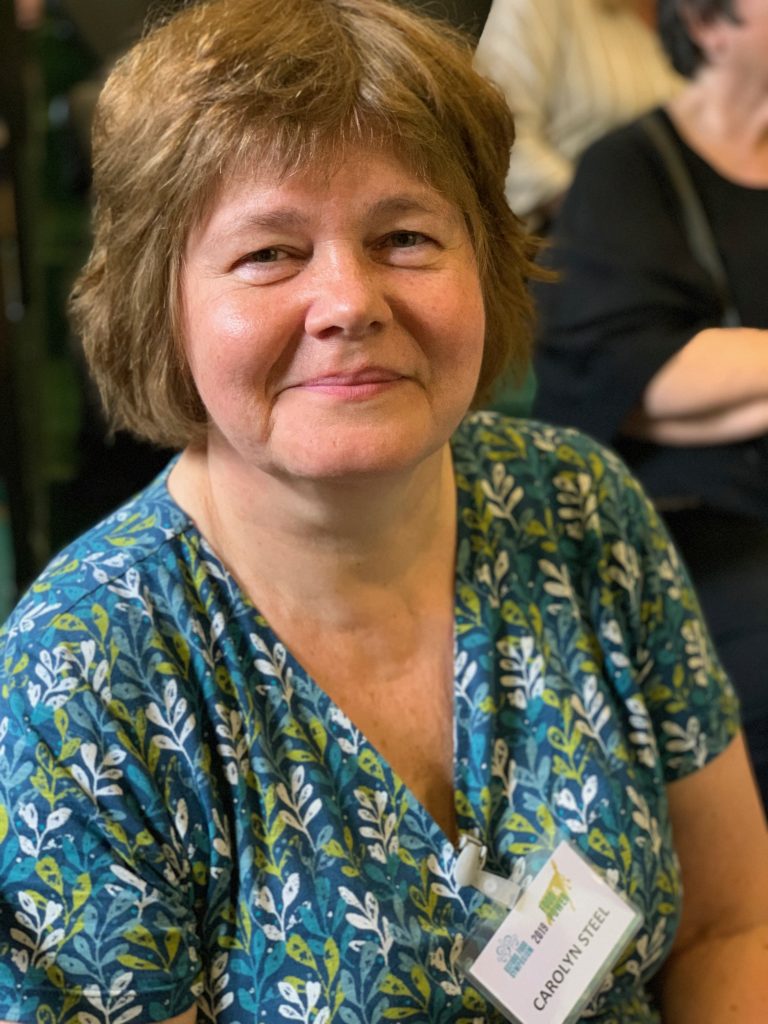
Carolyn Steel
Carolyn Steel, author of Hungry City. I was so impressed I bought the book. Her talk discussed how food, access to it, selling it, shapes our cities.
‘Farmers stay put while hunter gatherers are mobile. Minute you have farming you need architecture. Cities = hierarchy. Rome was the first city to have more than 1 million residents by 300AD.’
‘London has a navigable river and Paris doesn’t. This explains Brexit.’ She means that large ships can reach the centre of London but not Paris, so we have always been more global facing.
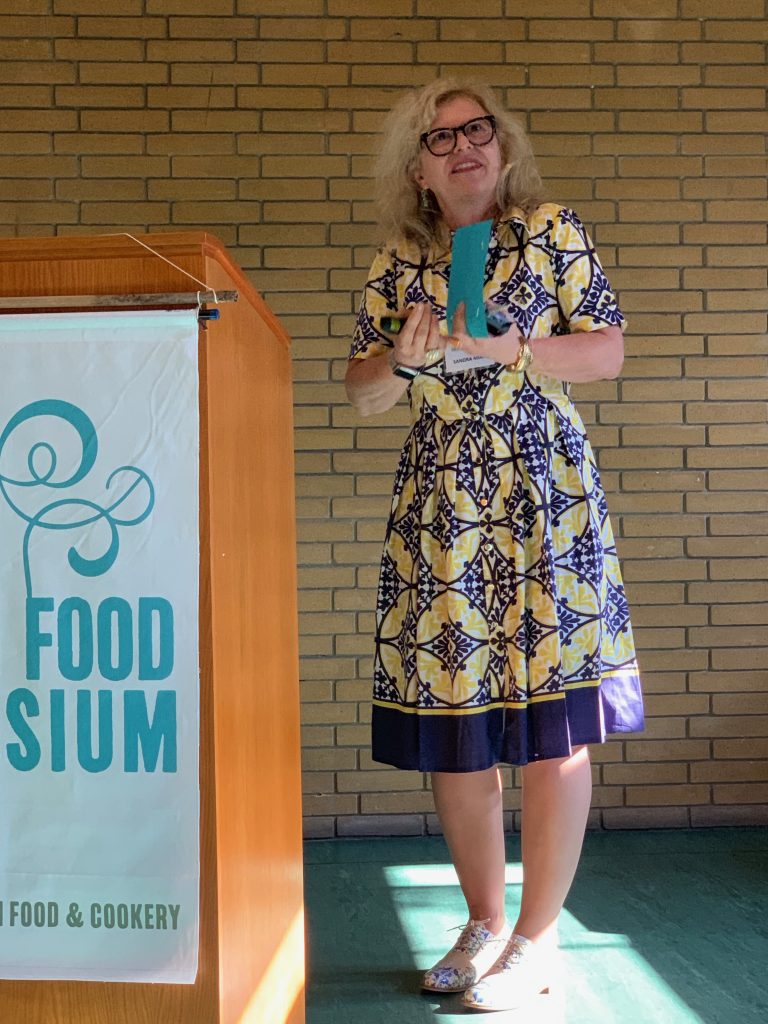
Sandra Mian 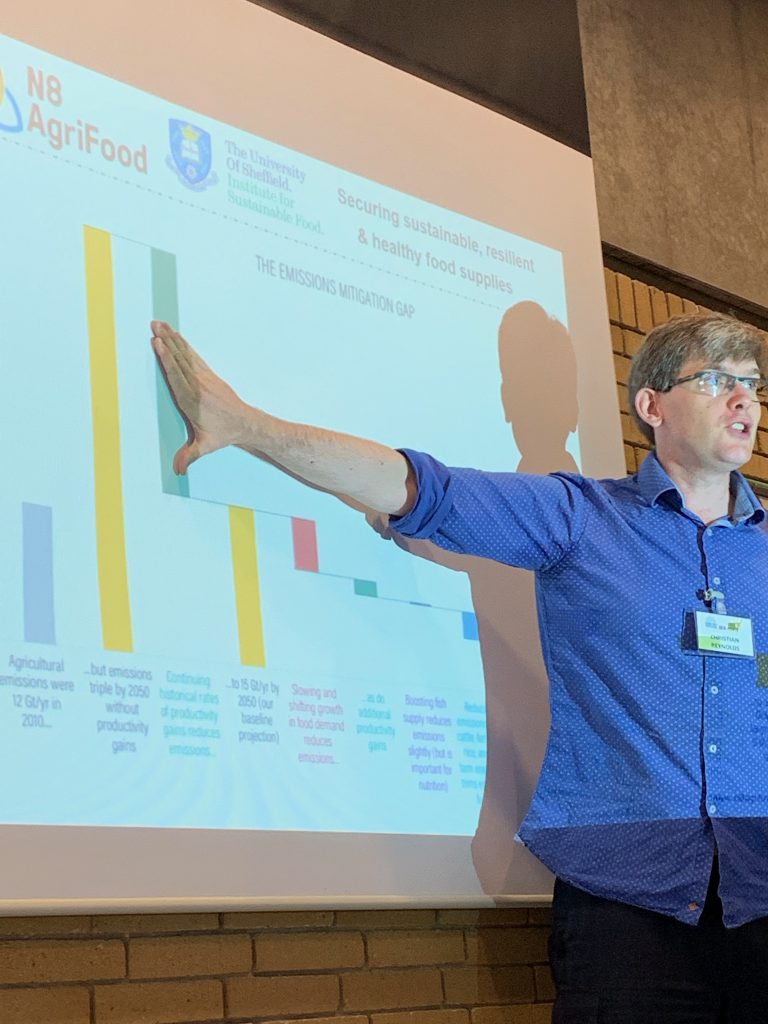
Christian Reynolds
Christian Reynolds who talked about energy consumption not just in terms of food growing but of cooking methods. He’s currently seeking funding to explore this more scientifically. (Also met his mum, food historian Alison Reynolds, who is awesome and wrote a book about Anzac biscuits).
‘An oven is a grossly inefficient way of cooking. Microwaves, sous vide (vacuum pack cooking) and slow cookers are better. ‘
‘Is it more sustainable to: 1) buy ready made hummus 2) buy tinned chickpeas and make hummus 3) or soak dried chickpeas, cook them then make hummus?’
‘We use less energy in cooking now – we use half what we used in 1970’
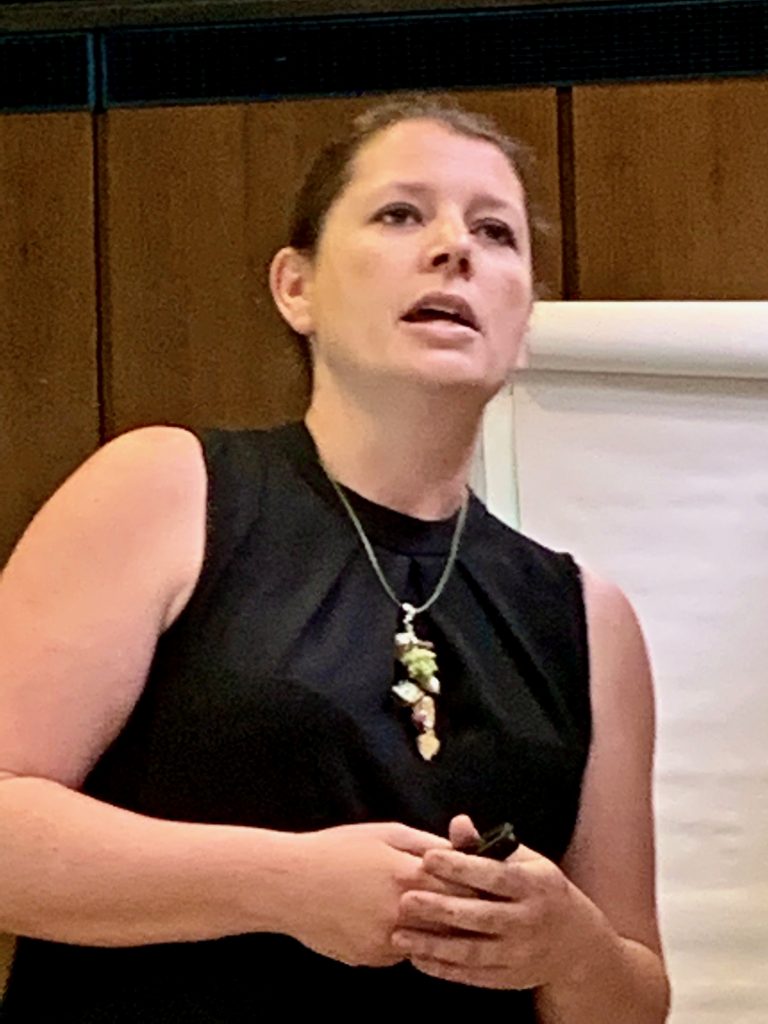
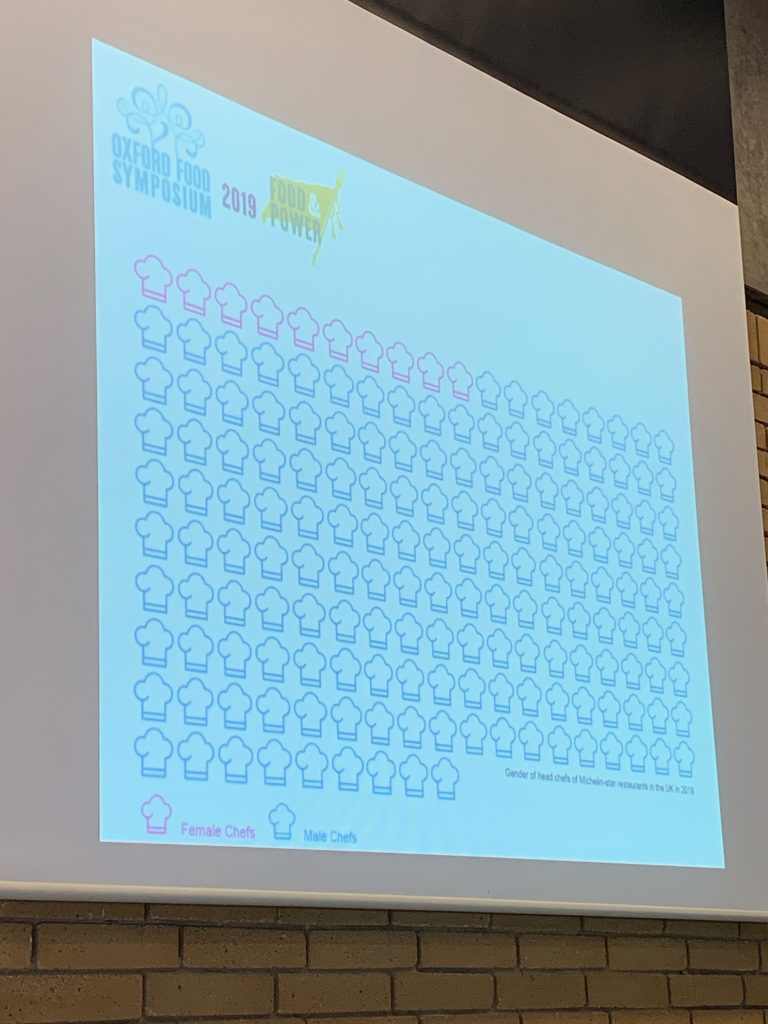
male v female chefs
Cordula Christina Peters, artist and chef, on the paucity of females in the Michelin starred kitchens.
‘165 Michelin star restaurants in the UK. Only 10 have female head chefs. Only 2 employ black head chefs. 8 have south Asian head chefs. 10 Michelin restaurants have other ethnic background head chefs. Rest are white/male. To what extent does internships/staging create this imbalance?’
Richard Shepro, lawyer and food historian, on law and baking.
‘The status of bread has fallen from critical staple to accompaniment’.
‘Bakers needed Government permission to leave the profession in 18th century France.’
‘Baker Dennis Francois was hanged in 1789 for hiding loaves. Government controlled bread and flour.’
‘Bread quantity & pricing had a huge effect on the French Revolution. There was an 11 hour work day. They ate 1.5 kilos of bread a day. Each. French bakers were not allowed to choose own vacation days (until 2015); all to keep social stability.’
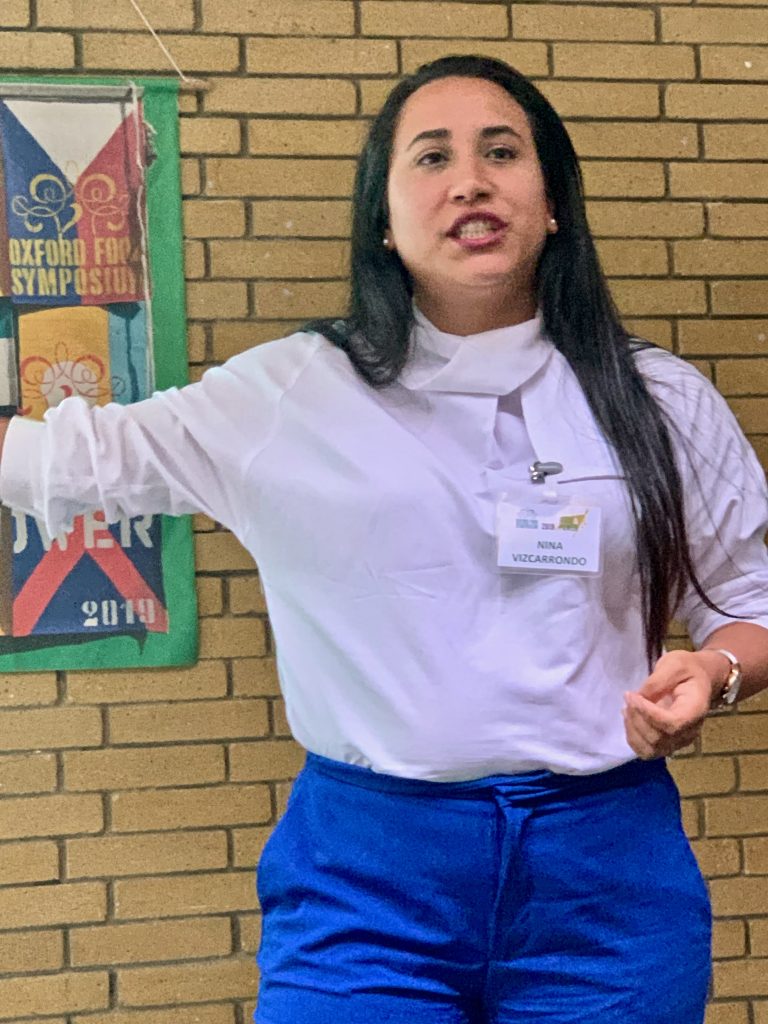
Nina Vizcarrando 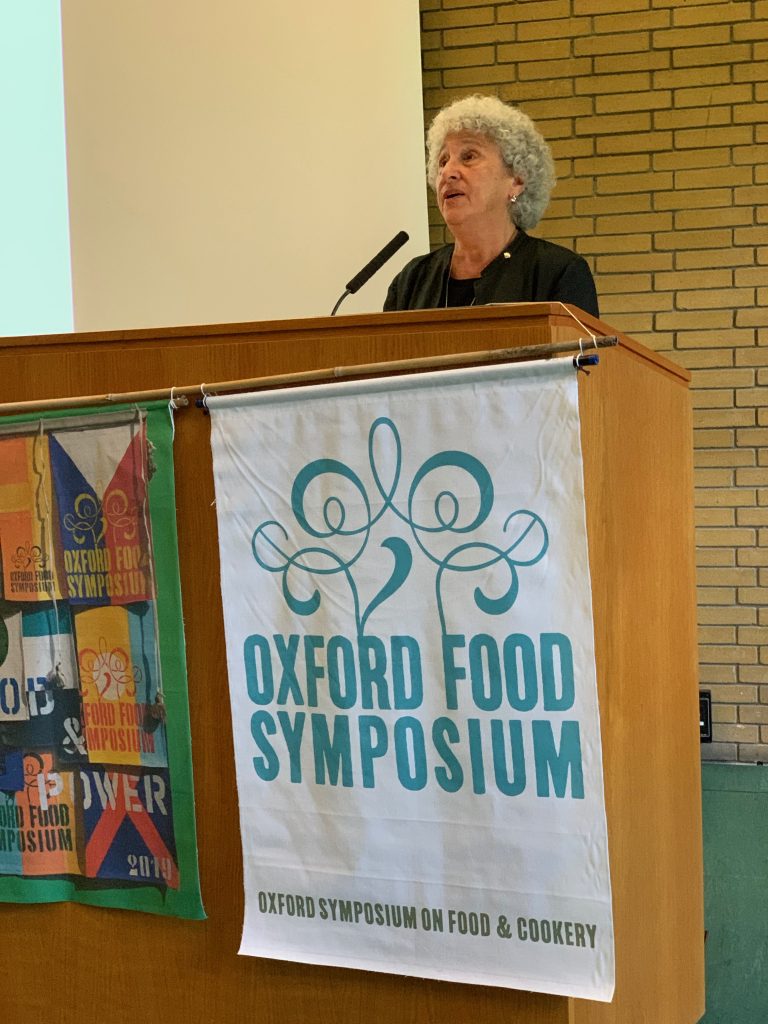
Marion Nestle
Marion Nestle on the politics of Big Food.
‘Food studies funded by industry almost always favours that industry. Next time you see a scientific study ‘proving’ x or y, look hard at who sponsored it.’
‘Even a prescription pad with the company’s logo on it and a free pen tends to influence prescribing by doctors. Although usually the ‘bribe’ is bigger.’
‘Even hard boiled American reporters don’t understand the extent to which Big Food funds virtually all food research- always favourable to their product.’
‘Governments aren’t strong enough to take on large food corporations. We are in the middle of a food movement right now but how to mobilise? We are fragmented. Food is elitist- based on consumption & consumers have no real power. Vote with your fork!’
Nina Vizcarrando on Alaskan native food and fishing stocks.
‘McDonald’s filet o’ fish is Alaskan pollock. They have huge trawlers fishing and freezing with no oversight. They propose reparations for local tribes in the form of food stamps.’
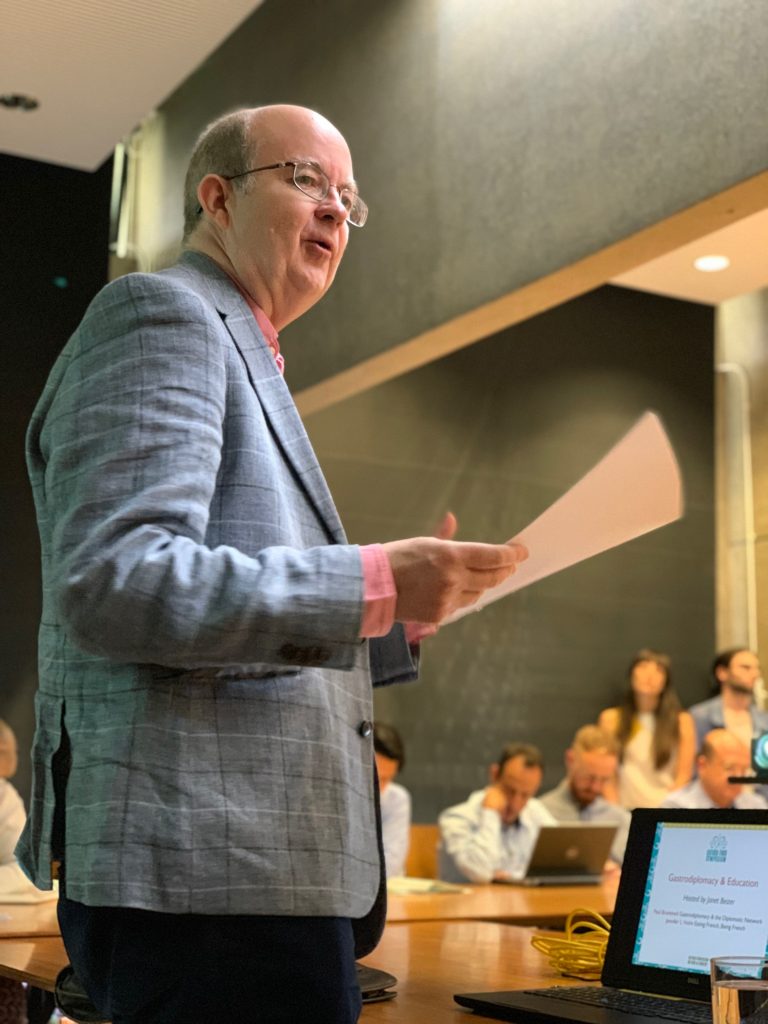
Paul Brummel 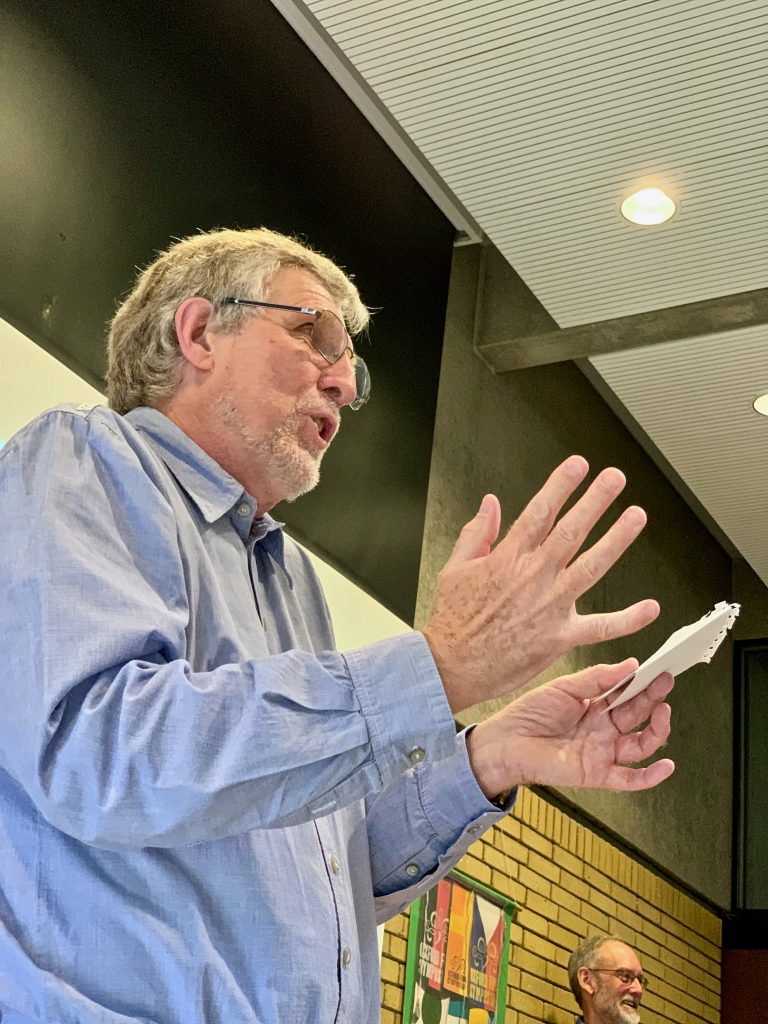
David Sutton
Paul Brummel, former British ambassador to Romania, on ‘gastrodiplomacy’: how national food and drink can improve relationships between countries.
Britain exercises ‘soft power’ by hosting events serving typically British food and ingredients. Britain exported food knowledge with the result that Joseph Harding ‘the father of Cheddar cheese’ shared his know-how and recipe with American cheese makers, to the detriment of West Country cheddar makers.
David Sutton spoke about food and the Phoenicians. Cumin originated in the Lebanon and Syria.
‘The Lebanon was previously Phoenician. The word Lebanon is related to dairy, as in ‘labne’ the cheese. ‘
‘Research from the last 5 years has shown DNA links from Ibiza and Malta where the people are related to Phoenicians.’
‘There are Spanish tapas dishes that are descended from Phoenician cooking such as spinach and chickpeas with cumin.’
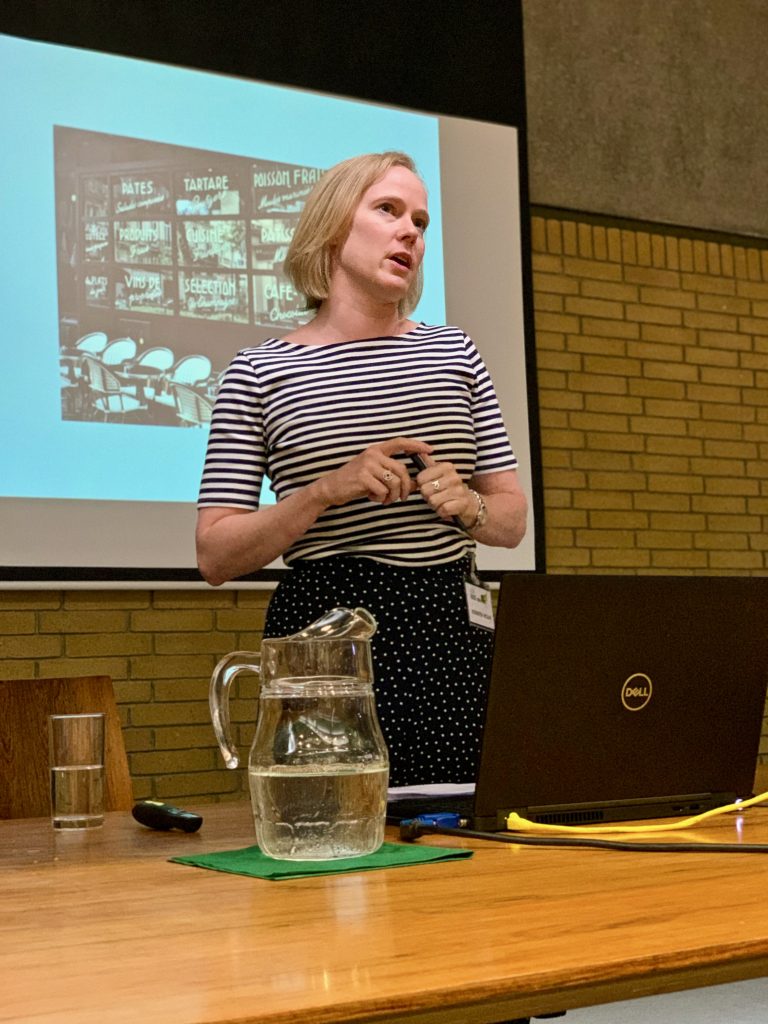
Jennifer Holm 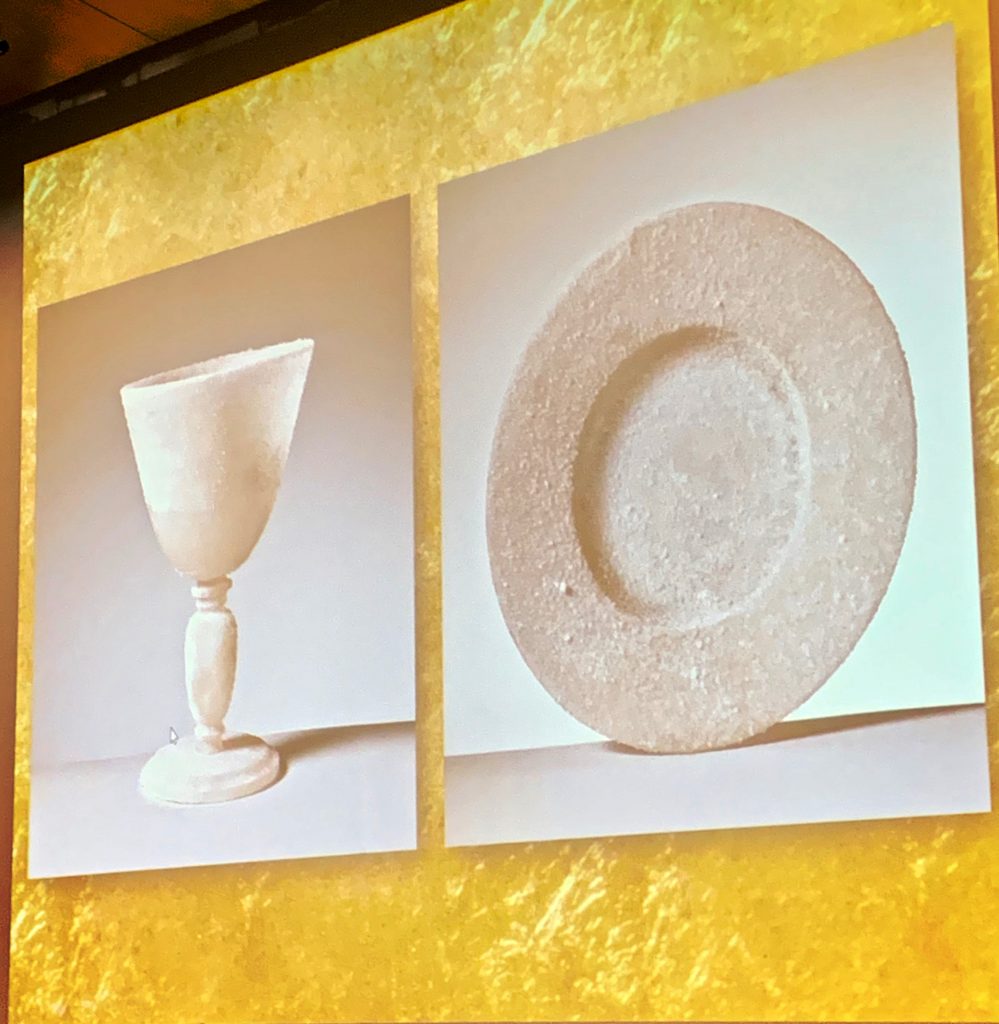
Sugar plate and goblet
Jennifer Holm on French food identity: UNESCO has defined the French Gastronomic Meal as “intangible cultural heritage”.
Michael Krondi on Sugar & Show: Henri III’s visit to Venice in 1547, and the extraordinary sugar banquets put on to impress him, virtually bankrupting the Venetians.
‘Costs: Venetians spent 2k lira on a sugar sculpture for a banquet. Way more expensive than a Fra Angelico oeuvre. A sugar banquet would cost more than a new building. If you had money you were supposed to flaunt it in Venice.’
‘In the 16th century Venetian chefs would take any recipe and sprinkle it with sugar & cinnamon. These were the ‘it’ flavours of 16th century Europe – used in fish pies as well as fruit dishes.’
‘A mason would have to work a day to earn enough to buy a pound of sugar in 16th century France. Today an American mason would work 3 minutes to have the same buying power. ‘
‘At one banquet the tablecloth, the bread, the cutlery, the napkins, everything was made of sugar. The guests could look at the large elaborate sugar sculptures, and were given them to take home as party favours. King Henri III took 40 sugar sculptures home.’
‘The fact that these expensive sugar sculptures wouldn’t last long in Venetian humidity was part of the show & signalling of extravagance. The sugar was exported from Egypt.’
Best meals:
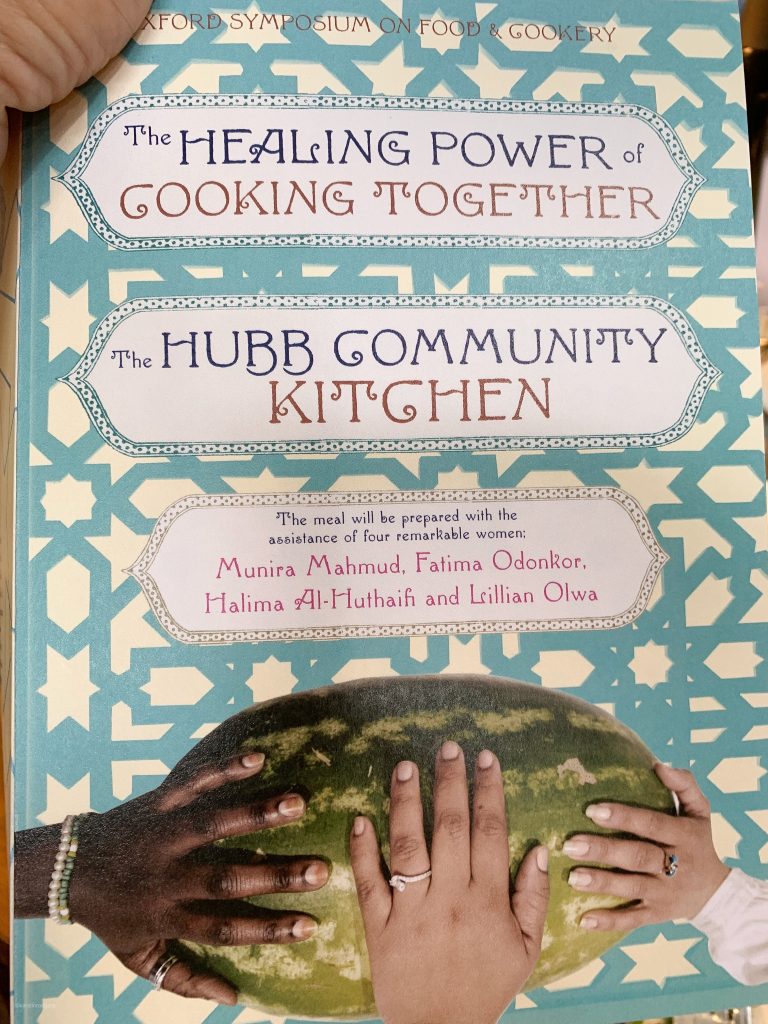
Hubb Community Kitchen 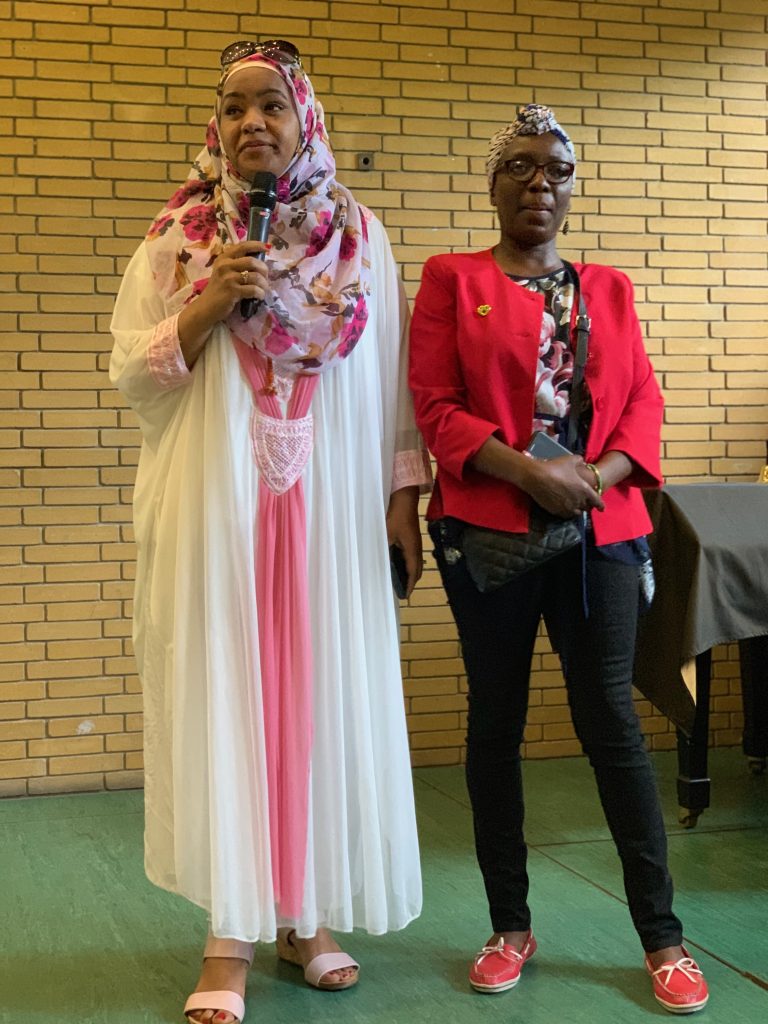
Hubb kitchen chefs
I really enjoyed the lunch cooked by the Hubb kitchen, the Grenfell women. Always wary of right-on good causes, the food was absolutely delicious. Did you know that ‘hubb’ is Arabic for ‘love’?
The lunch by female producers and suppliers of Borough market was excellent: how could it not be with fabulous cheeses, breads and salads. My kind of food.
The symposium offers a selection of wine and other drinks by producers. I loved the Mezcal tequila and the Greek wines in particular.
Best conversations:
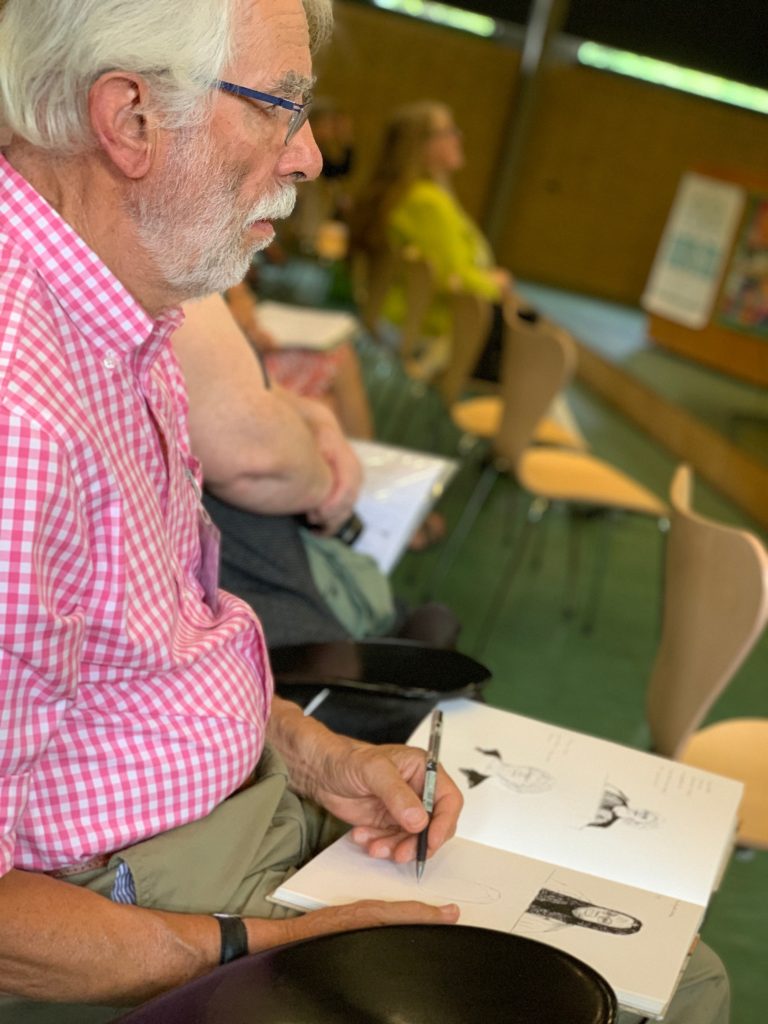
An artist capturing portraits of speakers 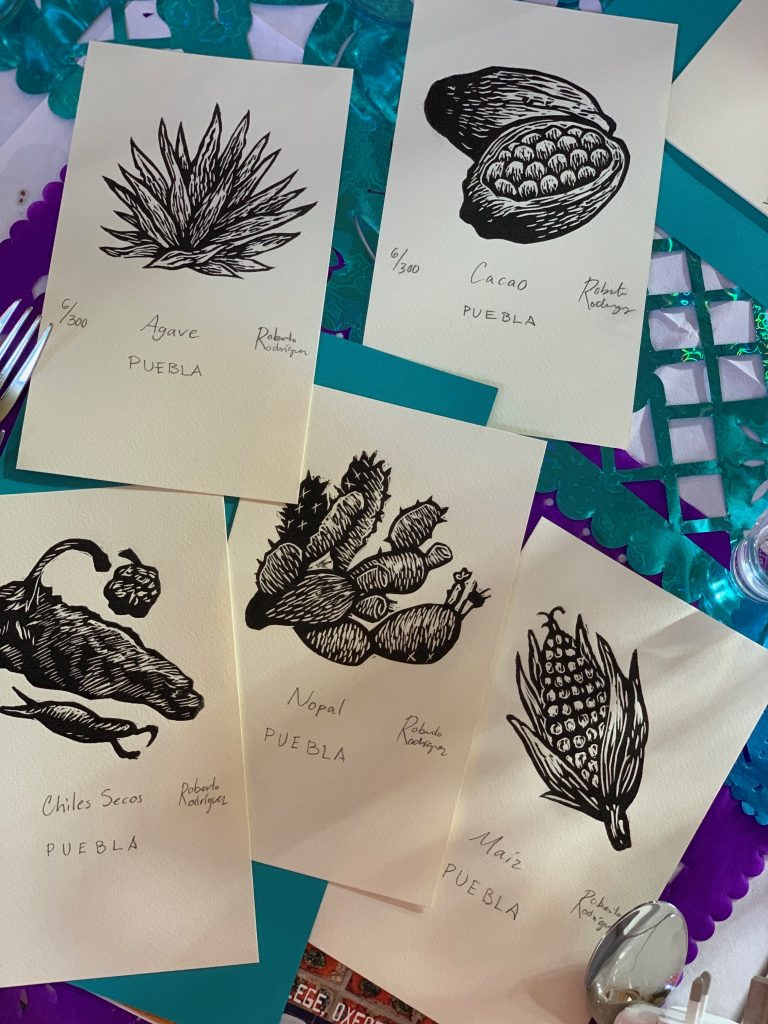
Mexican artist from Puebla
Like most conferences, part of the pleasure lies in the informal talks between symposiasts, as well as the official talks on stage. You get an opportunity to chat, gossip, moan, bitch, exchange ideas and contacts with other food writers.
Hattie Ellis
Hattie, author of 11 books including Spoonfuls of Honey, told me she was no longer writing cookery books. ‘It’s bad for my health’ she admitted. I totally see what she means. It slightly depends on the subject matter: writing my carrot book and V is for Vegan was fine but Msmarmitelover’s Secret Tea Party, with all the cake and biscuits I had to be very careful. I was binning whole cakes.
Xanthe Clay
Xanthe has just celebrated her 20th anniversary of food writing for the Telegraph. ‘I’m just grateful to have had the work’ she told me, sympathising with freelancers, ‘it’s cold outside’. Xanthe is ever curious and totally unsnobby about food and people. ‘When are you writing your next book?’ I asked.
Di Murrell
Di and her husband were boat people. He actually looks like a sea captain with white whiskers. I recommended her last book ‘Barges and Bread’ as one of my books of 2018. It’s a history of baking: bread recipes from the bible to the modern day. At the same time, she explores how the canal system and rivers were essential to our food culture. As Carolyn Steel mentioned in her lecture; for millennia, ‘water was the cheapest way to transport food’.
Jessica Seaton
I met cookbook author Jessica Seaton who is now a trustee of the Oxford Food Symposium. I interviewed her a couple of years ago, visiting her flat in the Barbican. She must have felt at home in the brutalist surroundings of St Catherine’s college. ( A 1980s Arne Jacobsen designed listed building, which unaccountably meant that there was poor ventilation and terrible acoustics. Next time I will bring an electric fan. Not sure what can be done about the sound however, especially as I’m deaf in one ear anyway and had an ear infection in the ‘good’ ear.) Jessica has now sold her wonderful fashion and homeware business Toast. I got the feeling she was relieved. She told me that she and her husband Jamie are in the process of buying a working farm. It’s a brave decision.
Sejal Sukhadwala
I only briefly talked to Sejal but I wanted to signal how much I enjoy her Twitter feed. She writes knowledgeably of vegetarian food, food of the Indian subcontinent, racial politics and privilege in the food world.
Next year’s symposium is on the subject of Spices and Herbs (10th to 12th of July 2020). See you there!
info@oxfordsymposium.org.uk
Twitter: @OxfordFoodSymp
Facebook: Oxford Symposium on Food and Cookery

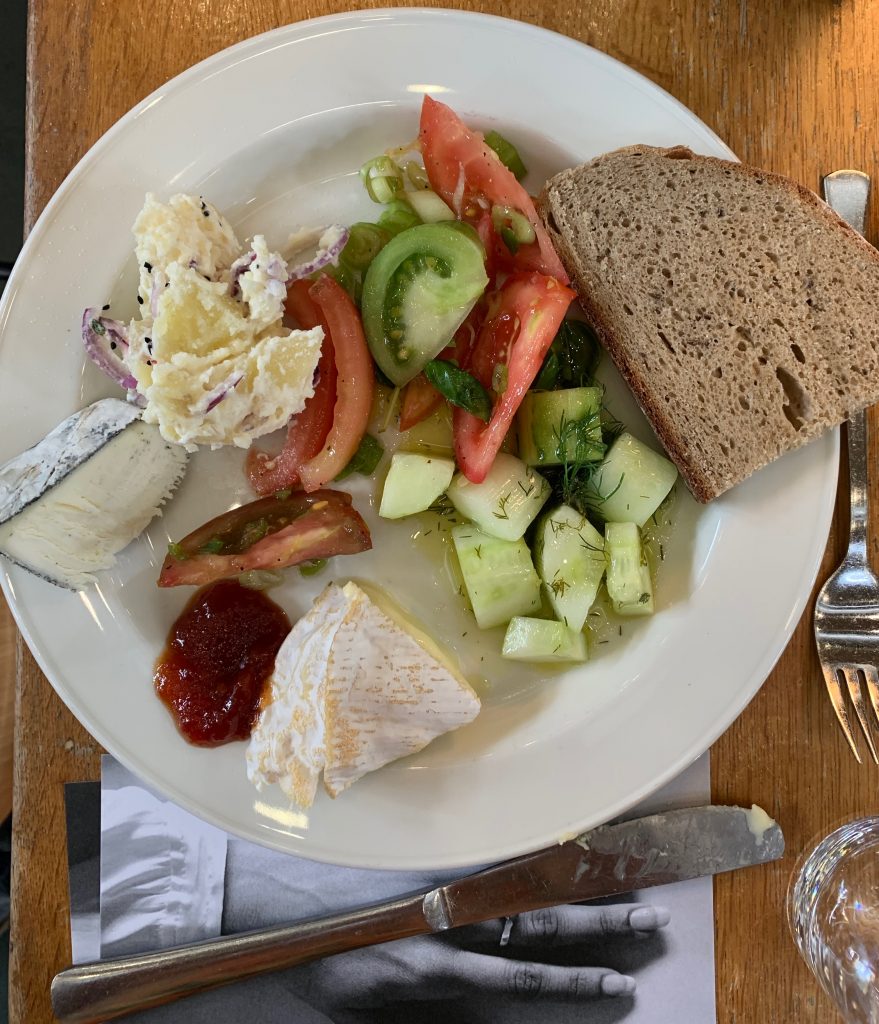
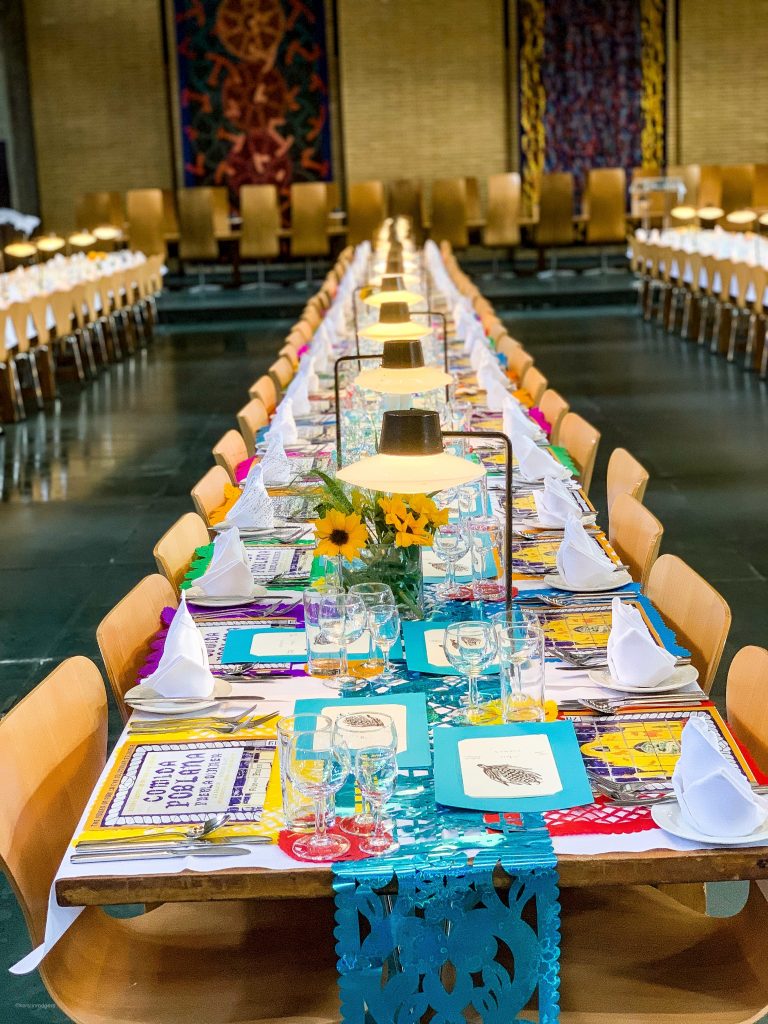
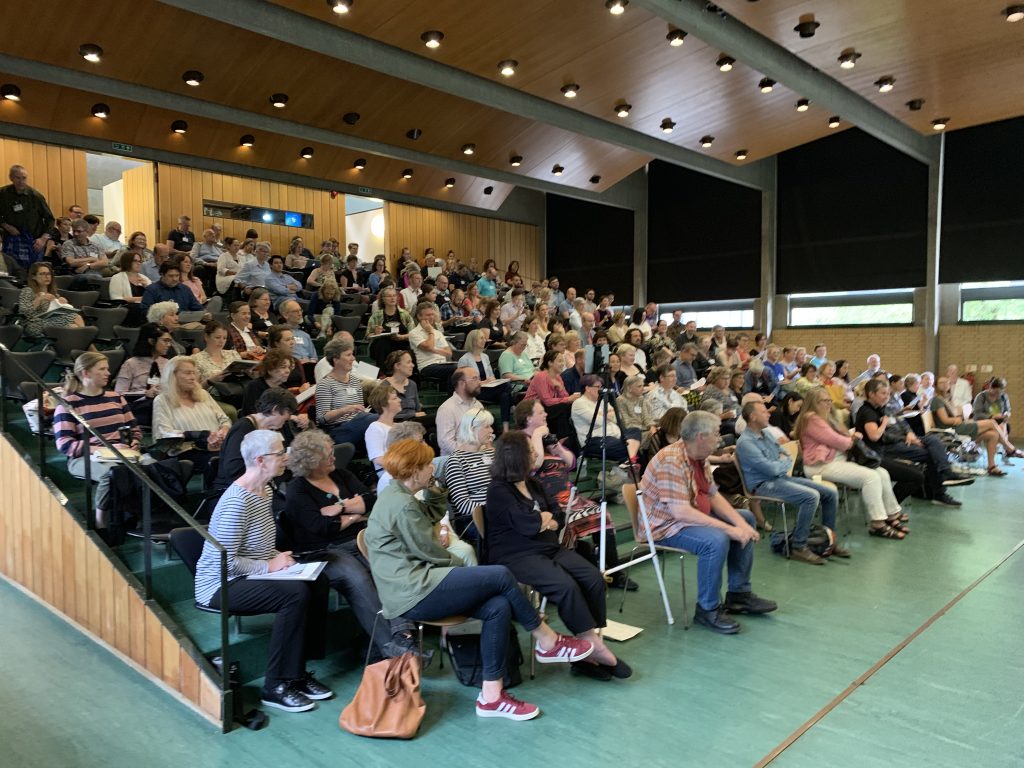



I have been mostly vegetarian for 45 years. When this happened, all dinner invites dried up immediately. I decided the only way to go was to invite people for dinner and cook the full roast including the meat but serve myself everything except the meat. Guests would look at my plate and comment oh you do eat almost normally.
They had been scared that I wanted some complicated brown dollop on my plate which they had never cooked or eaten. First of all, I did get an awful lot of omelettes. Enormous 3 or 4 egg monster which would have served two people at least. Otherwise I might keel over from starvation.
I don’t think that people who like meat should give it up BUT I agree Kerstin most people do eat too much meat. Well done for saying this.
Thanks for the report! I used to thumb through the proceedings of the symposium when I was a grad student and imagine it fondly, though as a vegetarian for nearly 30 years maybe I wouldn’t have enjoyed it as much in real life! I’m so glad you spoke up for vegetarians and vegans. I am really tired of foodie disdain for it.
I was talking to Aeyal and he said ‘I think it’s guilt’. I agree. The disdain is because inside they know they are wrong to encourage meat eating. They will get angry just reading this but if they were truly honest with themselves, they feel rather uncomfortable with it. Westerners have a choice of what to eat: they don’t need to eat cheap nasty meat every day. I haven’t eaten meat in 40 years but I’m not an extremist. Meat once or twice a week from sustainable sources, okay fine.
I guess there is still this class based attitude towards meat – if you are well off you can afford it. That’s why people on low incomes insist on eating meat, even if it’s crap stuff.
The Indians are so much smarter on this: be vegetarian. Eat pulses, eat plants.It’s not a class based thing as far as I’m aware.